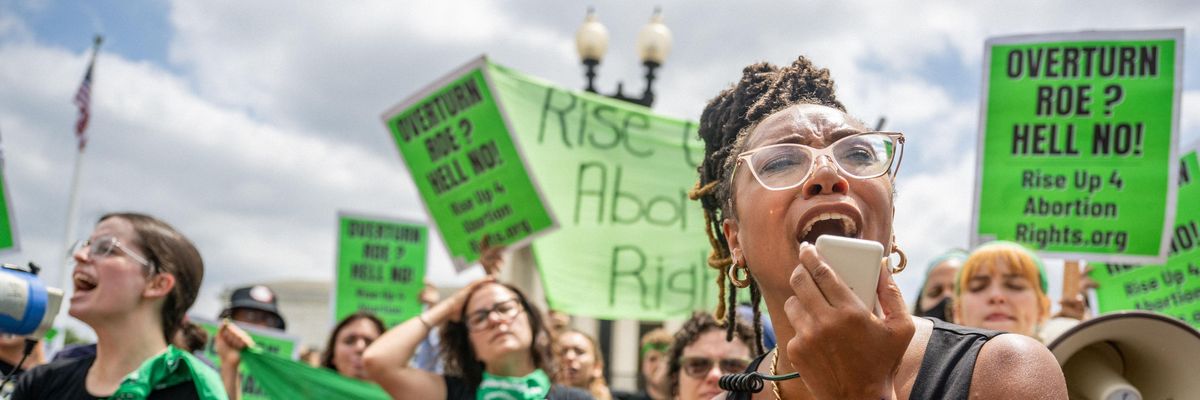Since the Supreme Court overturned Roe v. Wade, as we long feared, we've been forced to navigate a new legal landscape. The terrain for people seeking abortions is changing almost daily, and abortion care is increasingly threatened for more communities. In this new era, increased attention has been paid to when the "wave" of criminalization will begin for those providing or seeking abortion care. Prosecutors have declared they won't enforce laws and journalists have reported on possible police surveillance of period tracker apps. Yet, these responses are disconnected from what reproductive rights and justice advocates know about criminalization, and they are out of line with what I found in my research.
Over the last decade, I've been steeped in research and advocacy challenging the criminalization of people for pregnancy outcomes and self-managed abortions - abortions managed outside of the medical system. While abortion medication made self-managed abortions more accessible and safer, criminalization has always been an issue.
In fact, over the last two years, I've documented 61 cases from the years 2000 to 2020 in which people have been criminally investigated or arrested for self-managing their own abortion or helping someone else do so; the majority of these cases exclusively involved abortion medication. Our team analyzed publicly-reported case details to better understand exactly how the criminalization of self-managed abortion happens.
We've understood for years what it looks like when people are stigmatized for their healthcare decisions and what it means when the criminal system intervenes in this process. The future of abortion criminalization is an extension of our current criminal system, one built on injustice that dehumanizes people at every turn.
The criminalization of self-managed abortion reinforces that the criminal system targets those already experiencing unjust and racist societal structures. People who are already targets of state violence because of their race, income status, or being further along in their pregnancy have been the main targets of the 61 investigations we've documented. These communities are and have been most at risk for being restricted from accessing clinical care because of law or policy.
Though there has been a lot of focus on period tracker apps in recent months, we didn't find a single instance of an app like that being used in a case. This doesn't imply that state surveillance of data isn't a cause for concern, but what we've seen is that even less sophisticated forms of data and technology - text messages and Google histories - were wielded as evidence in some of these cases.
Instead, the biggest privacy threat is other people. Law enforcement were most often contacted by healthcare professionals - people that individuals reached out to when they were in need of care during or after their abortions. This breakdown of trust and ethics in these patient-doctor relationships is alarming. When healthcare workers police their patients, it can instill fear and push them away from care.
Investigations occurred in 26 states despite the fact that only seven states historically criminalized self-managed abortion; today that number is just three (Nevada, South Carolina, and Oklahoma). This means that overzealous police and prosecutors have circumvented the law's parameters in many states, subtly using criminal laws not meant to apply to allegations of self-managed abortion. Strikingly, regardless of whether these became the final charges, law enforcement considered applying murder or homicide charges in 43% of all 61 cases. These considerations happened twice as frequently in cases involving people of color compared to non-Hispanic white individuals. Racism and stigma infiltrated these investigations and further entrenched them in a crushing criminal process.
Ultimately, the majority of cases proceeded and most often concluded in a guilty plea - unsurprising given how most cases are resolved in the criminal system. But almost a quarter of the cases were dropped or dismissed by either the prosecutor or court. This should motivate advocates and trained criminal defenders to force a review of the charges so clients aren't wrongly convicted.
For anyone entangled in the criminal process, the harm lasts. Conviction or not, several people lost custody of their children temporarily or permanently. In one case, while local authorities declined to prosecute the woman after acknowledging the self-managed abortion was not unlawful, they still turned her over to immigration authorities for deportation.
Criminalization of self-managed abortion has already altered the lives of so many families. Because of abortion stigma, state actors have used their power to funnel people into systems of surveillance and control. The cases from the last twenty years show us what happens when racist and unjust systems take hold of abortion legality. Today, in the absence of Roe, as we are likely to see more and more cases of abortion criminalization, the law still matters and advocates must demand its full protection.



